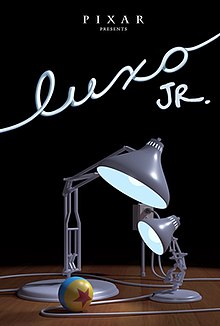Luxo, Jr.
| Luxo Jr. | |
|---|---|

Poster for Luxo Jr.
|
|
| Directed by | John Lasseter |
| Produced by | John Lasseter William Reeves |
| Written by | John Lasseter |
|
Production
company |
|
| Distributed by | Pixar |
|
Release date
|
|
|
Running time
|
2 minutes |
| Country | United States |
Luxo Jr. is a 1986 American computer-animated short film produced by Pixar and directed by John Lasseter. The two-minute short film revolves around one larger and one smaller desk lamp. The larger lamp, named Luxo Sr., looks on while the smaller, "younger" Luxo Jr. plays exuberantly with a ball that it accidentally deflates. Luxo Jr. was Pixar's first animation after Ed Catmull and John Lasseter left Industrial Light and Magic's computer division. It is the source of the hopping desk lamp included in Pixar's corporate logo.
Lasseter's aim was to finish the short film for the 1986 SIGGRAPH, an annual computer graphics conference attended by thousands of industry professionals. The film would come from his experiments with modeling his Luxo lamp. Lasseter worked to improve the story within the allotted two minutes. In animation, the film demonstrates the use of shadow maps within the rendering software. Lasseter applied classic animation principles defined by Disney's Nine Old Men to convey the lamps' emotions. Catmull and Lasseter worked around the clock, and Lasseter even took a sleeping bag into work and slept under his desk, ready to work early the next morning. In total it took about four and a half months to do.
The commitment paid off, and it was finished in time to be shown at SIGGRAPH. Before Luxo Jr. finished playing at SIGGRAPH, the crowd had already risen in applause.Luxo Jr. is regarded as a breakthrough in the animation medium as a whole, changing traditionalists' interpretation of computer animation. The short was the first work of animation to use procedural animation, the software written by Eben Ostby. It received an Academy Award nomination for Best Animated Short Film, becoming the first CGI film nominated for an Academy Award.
...
Wikipedia
